Dr. King in context: A revolutionary and visionary for freedom, justice, equality
By Charlene Muhammad, National Correspondent- January 16, 2024
The Rev. Dr. Martin Luther King Jr., speaking in Alabama on February 1968. Photo: AP Photo/Charles Kelly
Over the years, humanitarian and civil rights champion, Dr. Martin Luther King Jr., his mission, narrative and work have been gentrified, watered down, white-washed, hijacked and blatantly misquoted, but he was a revolutionary who truly fought for freedom, justice and equality.
As the nation prepares to honor and reflect on Dr. King with activities and events on the U.S. federal holiday marking his birth—observed the third Monday in January—it is important to understand and unpack his true legacy and impact.
His mission, his daughter, Reverend Dr. Bernice King, CEO of Martin Luther King Jr. Center for Nonviolent Social Change, made clear after stand-up comedian/actor Amy Schumer posted soundbites in an edited clip on some of his remarks about Israel’s right to exist, antisemitism and bigotry towards Catholics on X (Twitter) on October 30, 2023.
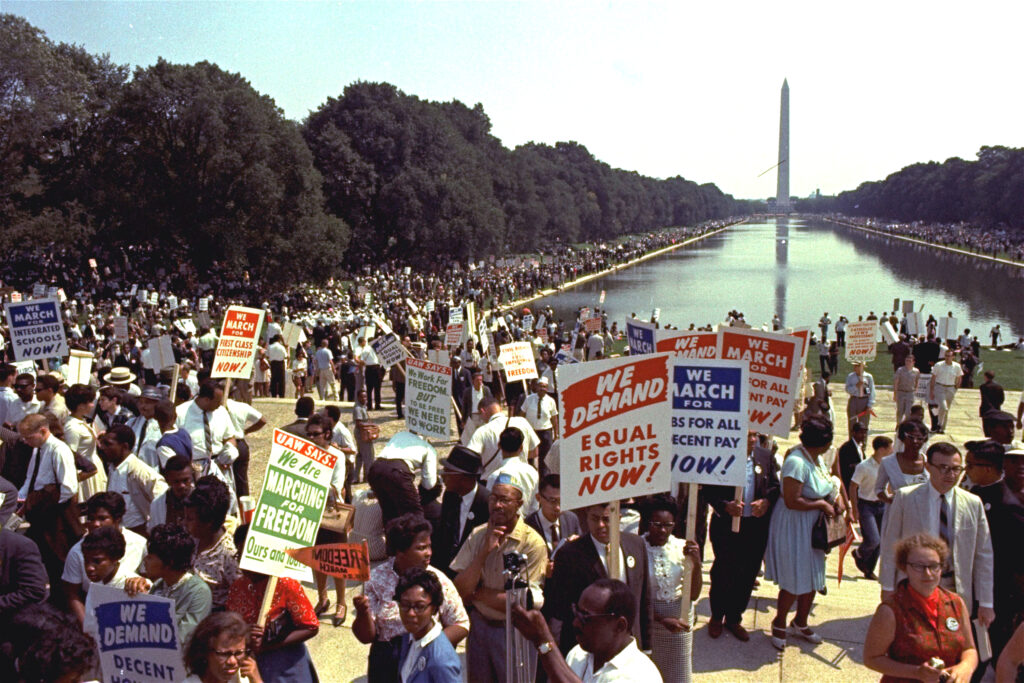
The crowds seen at the march on Washington, D.C. in which Dr. Martin Luther King gave his eloquent “I have a dream…” speech to a million – thronged mall on August 28, 1963. (AP Photo)
“Certainly, my father was against antisemitism, as am I. He also believed militarism (along with racism and poverty) to be among the interconnected Triple Evils. I am certain he would call for Israel’s bombing of Palestinians to cease, for hostages to be released …,” Dr. Bernice King tweeted directly to Ms. Schumer the next day.
“Certainly, my father was against antisemitism, as am I. He also believed militarism (along with racism and poverty) to be among the interconnected Triple Evils. I am certain he would call for Israel’s bombing of Palestinians to cease, for hostages to be released …,” Dr. Bernice King tweeted directly to Ms. Schumer the next day.
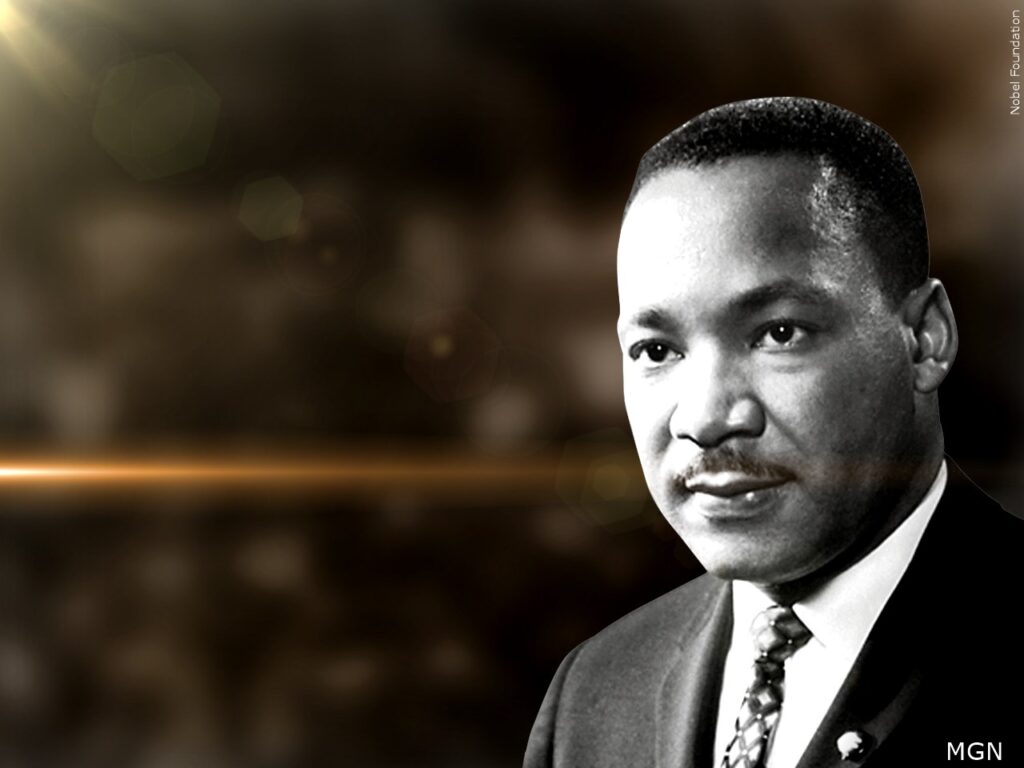
She continued, “and for us to work for true peace, which includes justice.” He said, ‘“Justice at its best is love correcting everything that stands against love. We have much to correct.”’
Dr. Bernice King then continued with a clip of her father talking about withdrawing from the Vietnam War and “moral power,” and #MLK.
Two years ago, Dr. Bernice King issued a similar call:
“Please stop using out of context quotes from my father to excuse not working to eradicate racism. His ‘content of their character’ quote lies within a full speech, ‘I Have A Dream,’ in which he talks about ending racist police brutality and economic injustice,” she posted.
“The handling of Dr. King in mainstream spaces, there has been an exercise in reductionism and this has been the case with so many of our great Black luminaries, the heroes and heroines of our struggle,” stated Student Minister Demetric Muhammad of Mosque No. 55 in Memphis.
They are reduced to slogans and more softer aspects of their legacies, such as with Dr. King and his famous August 28, 1963 “I Have a Dream” speech, he added. It is most times referenced, yet Dr. King continued to live for five more years, and people never hear about his 1966 meeting with the Honorable Elijah Muhammad, the Eternal Leader of the Nation of Islam.
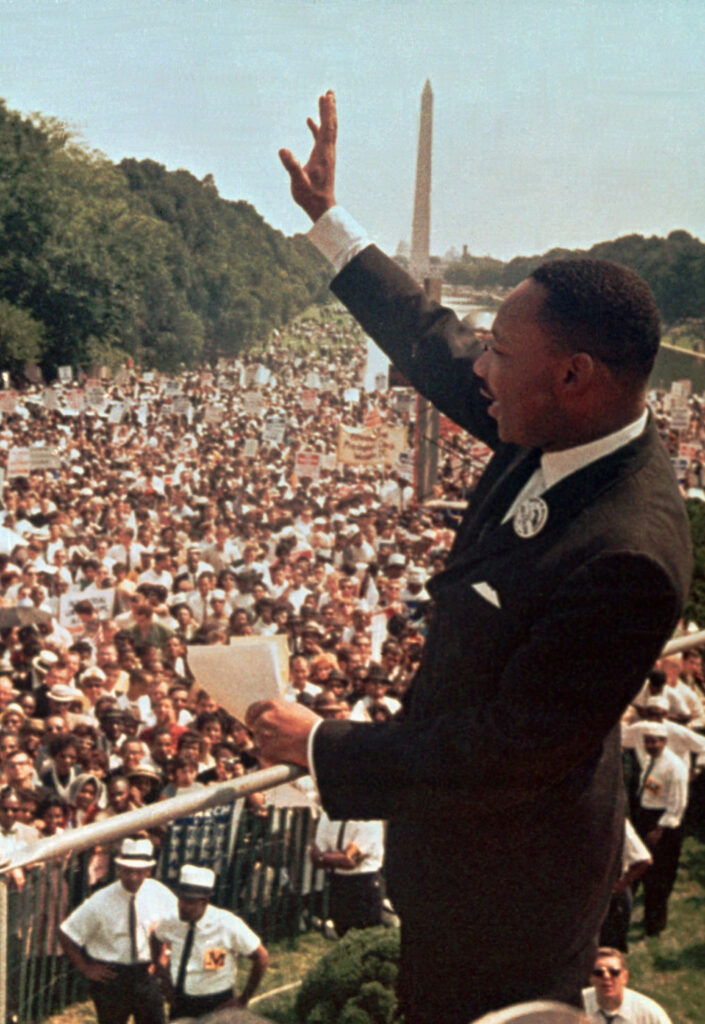
The Rev. Martin Luther King Jr. acknowledges the crowd at the Lincoln Memorial for his “I Have a Dream” speech during the March on Washington, D.C., on Aug. 28, 1963. The march was organized to support proposed civil rights legislation and end segregation. King founded the Southern Christian Leadership Conference in 1957, advocating nonviolent action against America’s racial inequality. Awarded the Nobel Peace Prize in 1964, King was assassinated in Memphis, Tenn., in 1968. (AP Photo)
There is silence about Dr. King’s saying that he thought that temporary separation of Blacks and Whites might be a good idea or what he experienced when he left the South and he went to cities like Chicago, and thousands of Whites came out and protested against him, said Student Minister Demetric Muhammad, an author and member of the Nation of Islam Research Group.
Dr. King was somewhat amazed to see that the racism in the North was not different than the racism of the South, but there are so many aspects of him that often time is hidden if the information source is a mainstream media outlet or some corporate sponsor, he noted.
“And this is why the Honorable Minister Louis Farrakhan’s choice, for example, to make the Million Man March a march that did not have funding from corporate America is so important, because as the old saying goes, whoever pays the piper calls the tune, in other words, whoever finances you can dictate how the program is going to go and how you will spend their money,” said Student Minister Demetric Muhammad.
“King has been sanitized,” stated Attorney Nkechi Taifa, director of the Reparations Education Project. However, he was in the process of moving out of the mythological, sanitized box people put him in, as exhibited in his April 16, 1963, “Letter From Birmingham Jail,” stated Atty. Taifa.
In it, Dr. King called for action, for freedom now, but people keep waiting for the ideal time or set of conditions before they move, she told The Final Call.
“I would like to hear more about what King was talking about when he said we’re coming to Washington to get our check … because that ties right into the reparations,” stated Atty. Taifa. She interpreted that in many ways; not just getting a check, but there’s a whole panoply of remedies that should have improved since the enslavement period, she continued.
She would have loved to hear more about Dr. King in his early years, for example, he was a contemporary of Black nationalist matriarch Queen Mother Ali Moore, she said. “There’s a lot about King that has not been out there as part of the public discourse that we really deserve to have known more about and not have them just paint it inside a box with the lid on. Let’s have the lid come off and hear all that he was about,” added Atty. Taifa.
Dr. King was somewhat amazed to see that the racism in the North was not different than the racism of the South, but there are so many aspects of him that often time is hidden if the information source is a mainstream media outlet or some corporate sponsor, he noted.
“And this is why the Honorable Minister Louis Farrakhan’s choice, for example, to make the Million Man March a march that did not have funding from corporate America is so important, because as the old saying goes, whoever pays the piper calls the tune, in other words, whoever finances you can dictate how the program is going to go and how you will spend their money,” said Student Minister Demetric Muhammad.
“King has been sanitized,” stated Attorney Nkechi Taifa, director of the Reparations Education Project. However, he was in the process of moving out of the mythological, sanitized box people put him in, as exhibited in his April 16, 1963, “Letter From Birmingham Jail,” stated Atty. Taifa.
In it, Dr. King called for action, for freedom now, but people keep waiting for the ideal time or set of conditions before they move, she told The Final Call.
“I would like to hear more about what King was talking about when he said we’re coming to Washington to get our check … because that ties right into the reparations,” stated Atty. Taifa. She interpreted that in many ways; not just getting a check, but there’s a whole panoply of remedies that should have improved since the enslavement period, she continued.
She would have loved to hear more about Dr. King in his early years, for example, he was a contemporary of Black nationalist matriarch Queen Mother Ali Moore, she said. “There’s a lot about King that has not been out there as part of the public discourse that we really deserve to have known more about and not have them just paint it inside a box with the lid on. Let’s have the lid come off and hear all that he was about,” added Atty. Taifa.
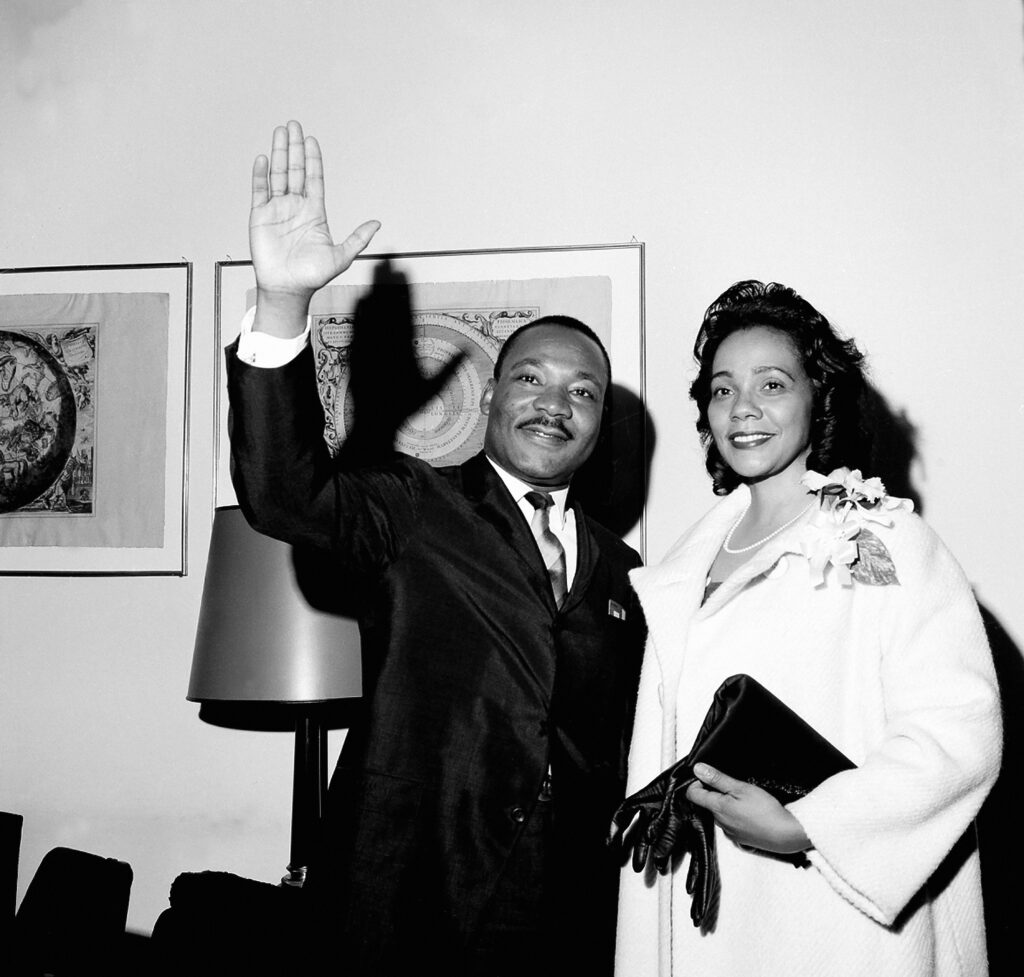
The Rev. Dr. Martin Luther King Jr. is accompanied by his wife, Coretta Scott King, as he appears at a press conference on the occasion of the release of his book “Why We Can’t Wait,” in New York , on June 8, 1964. (Jacob Harris/AP Photo)
To ensure that Dr. King is portrayed as the true revolutionary that he is, Black writers, historians and periodicals, must conduct their own independent research into his life and then present him to Black people, and subsequently to the world through their eyes and lens, recommended Student Minister Demetric Muhammad.
“As the old saying goes, ‘The oppressor sees the freedom fighter as a threat, but the oppressed sees the freedom fighter as a freedom fighter,’ and so should not the oppressed take control of the history of their own freedom fighter,” he questioned.
“We see Dr. King as a freedom fighter and we have to arrest control of his history, his legal, his narrative, away from those who are the oppressors who he was fighting against on our behalf. In addition to that, we have to seek and create opportunity to share the truth of Dr. King and other great Black leaders to young people.”
It is what Minister Farrakhan did when he brought Dr. King to the world through his preparation leading up to the 20th Anniversary of the Million Man March (Justice Or Else!), October 10, 2015, in Washington, D.C. The Minister lifted up the Dr. King who called for Blacks to redistribute the pain of injustice and brutality suffered at the hands of Whites in America by waging an economic boycott of U.S. corporations.
Minister Farrakhan explained that Dr. King was a man evolving toward a common goal for his people but that he was assassinated before he reached it.
Minister Farrakhan asked and encouraged the world to study Dr. King’s last speeches, and reflect on the evolution of his message, which moved from one of an integrationist “dreamer” in 1963, to one of a true wide awake revolutionary in 1968 when he was murdered.
“When I read it, I said, this man, you must know the reality of Dr. King. He’s more than a dreamer and don’t you let them throw the ‘Dream’ speech on you from ’63,” Minister Farrakhan instructed during his August 2015 lecture in Memphis, Tenn., as part of a tour to promote Justice Or Else!
“Let them play for you the speech that he made in New York City when he condemned the hypocrisy of the Johnson government that’s fighting a war in Vietnam against poor people there and practicing violence, then want Dr. King to preach nonviolence to us, while they’re training you to kill people that never did nothing to you overseas,” Min. Farrakhan said.
In addition to lifting Dr. King’s words, Minister Farrakhan resurrected Dr. King’s desire to retaliate after White supremacists bombed 16th Street Baptist Church in Alabama which killed four little Black girls.
To ensure that Dr. King is portrayed as the true revolutionary that he is, Black writers, historians and periodicals, must conduct their own independent research into his life and then present him to Black people, and subsequently to the world through their eyes and lens, recommended Student Minister Demetric Muhammad.
“As the old saying goes, ‘The oppressor sees the freedom fighter as a threat, but the oppressed sees the freedom fighter as a freedom fighter,’ and so should not the oppressed take control of the history of their own freedom fighter,” he questioned.
“We see Dr. King as a freedom fighter and we have to arrest control of his history, his legal, his narrative, away from those who are the oppressors who he was fighting against on our behalf. In addition to that, we have to seek and create opportunity to share the truth of Dr. King and other great Black leaders to young people.”
It is what Minister Farrakhan did when he brought Dr. King to the world through his preparation leading up to the 20th Anniversary of the Million Man March (Justice Or Else!), October 10, 2015, in Washington, D.C. The Minister lifted up the Dr. King who called for Blacks to redistribute the pain of injustice and brutality suffered at the hands of Whites in America by waging an economic boycott of U.S. corporations.
Minister Farrakhan explained that Dr. King was a man evolving toward a common goal for his people but that he was assassinated before he reached it.
Minister Farrakhan asked and encouraged the world to study Dr. King’s last speeches, and reflect on the evolution of his message, which moved from one of an integrationist “dreamer” in 1963, to one of a true wide awake revolutionary in 1968 when he was murdered.
“When I read it, I said, this man, you must know the reality of Dr. King. He’s more than a dreamer and don’t you let them throw the ‘Dream’ speech on you from ’63,” Minister Farrakhan instructed during his August 2015 lecture in Memphis, Tenn., as part of a tour to promote Justice Or Else!
“Let them play for you the speech that he made in New York City when he condemned the hypocrisy of the Johnson government that’s fighting a war in Vietnam against poor people there and practicing violence, then want Dr. King to preach nonviolence to us, while they’re training you to kill people that never did nothing to you overseas,” Min. Farrakhan said.
In addition to lifting Dr. King’s words, Minister Farrakhan resurrected Dr. King’s desire to retaliate after White supremacists bombed 16th Street Baptist Church in Alabama which killed four little Black girls.
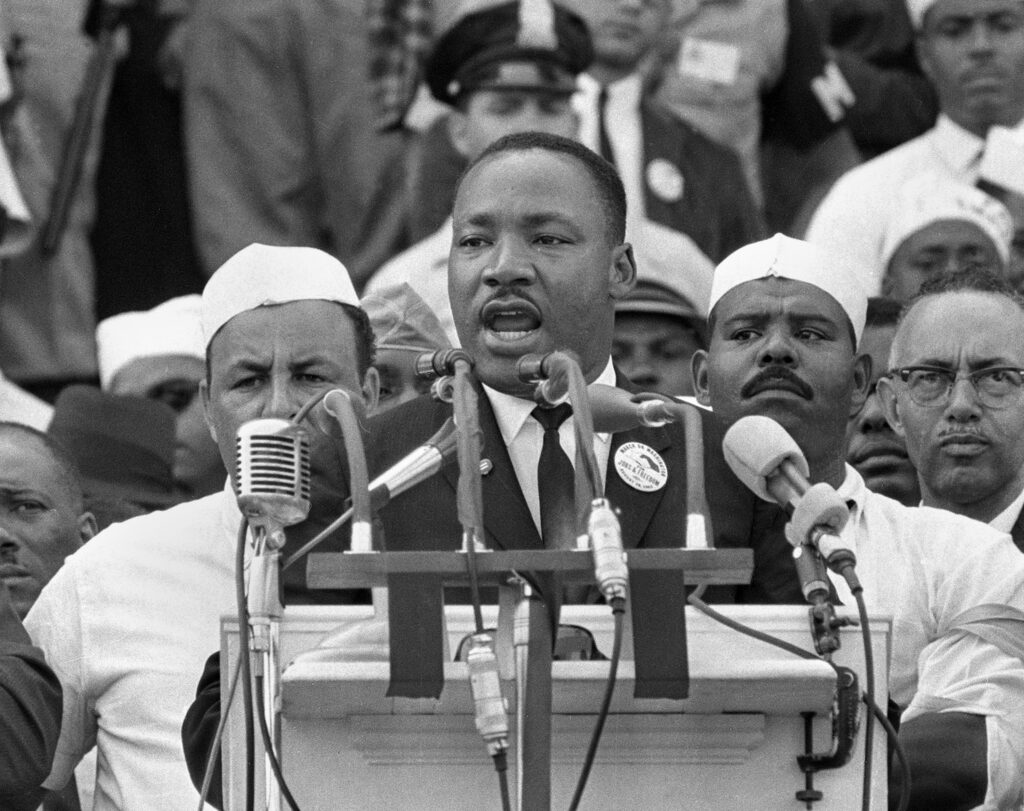
In this Aug. 28, 1963, file photo, Dr. Martin Luther King Jr., head of the Southern Christian Leadership Conference, addresses marchers during his “I Have a Dream” speech at the Lincoln Memorial in Washington. As civil rights leaders and activists gather Monday, Jan. 16, 2017, at sites across the country to celebrate the legacy of Martin Luther King Jr., the slain civil rights leader’s daughter Bernice King is encouraging Americans to fight for his vision of love and justice “no matter who is in the White House.” (AP Photo, File)
“He wanted to do all-out war, not violence. But shut it down, but he didn’t have the support. He wanted to boycott Christmas. So, today, so, today, I’m asking us, all of us, let’s boycott Christmas,” in Dr. King’s name, Minister Farrakhan said.
And some young people got it, that is, an understanding of the true essence of Dr. King, as indicated by some of their writings:
“… I don’t need Your watered down King; the Dr. King you make simple, the King you only mention with subtleties as if he was meek, minor, minute. Of a champion’s truth, Dr. King is more than worthy. Call him a lion. His accomplishments should roar loudly in history books, on talk segments where we are identifying, describing, the man, the humanitarian, the preacher, the fighter, writer, speaker, teacher, reacher, leader, word warrior,” writes Christopher Sims in “I Don’t Need Your Watered-Down King: A Poem.”
The poem continues, “I need the revolutionary Dr. King who was educated by various religious truths, leanings; the never afraid King who moved his family into a housing project in Chicago; the mighty King who challenged economic inequity years ago at the White House lawn with the Poor People’s Campaign!”
Aleeya Alam, a Los Angeles Times high school contributor wrote in a 2021 op-ed, “MLK’s peaceful rhetoric has been weaponized as a way to wrongfully critique the Black Lives Matter movement. …”
Ms. Alam went on to note that in the summer of 2020, while Black Lives Matter protests were taking place in hundreds of cities nationwide, Dr. King’s son, Martin Luther King III, tweeted his father’s words, “A riot is the voice of the unheard,” and “was met with extreme backlash, many stating he was taking his own father’s words out of context. The legacy of Martin Luther King Jr. has been politicized in a way to silence the outrage of the same people MLK would have given a platform to.”
“Dr. King died with an extremely high disapproval rate. He would be shocked to see how popular he has become. He would be even more shocked to see how his rhetoric was being used today,” continued Ms. Alam.
It is the Minister’s loving heart and respect for all of his people, regardless of their ideology, theology or philosophy, that has caused him, as a follower of the Honorable Elijah Muhammad to take a second look at Dr. King, stated Student Minister Abdul Haleem Muhammad, Southwest Regional Representative of the Nation of Islam.
“He wanted to do all-out war, not violence. But shut it down, but he didn’t have the support. He wanted to boycott Christmas. So, today, so, today, I’m asking us, all of us, let’s boycott Christmas,” in Dr. King’s name, Minister Farrakhan said.
And some young people got it, that is, an understanding of the true essence of Dr. King, as indicated by some of their writings:
“… I don’t need Your watered down King; the Dr. King you make simple, the King you only mention with subtleties as if he was meek, minor, minute. Of a champion’s truth, Dr. King is more than worthy. Call him a lion. His accomplishments should roar loudly in history books, on talk segments where we are identifying, describing, the man, the humanitarian, the preacher, the fighter, writer, speaker, teacher, reacher, leader, word warrior,” writes Christopher Sims in “I Don’t Need Your Watered-Down King: A Poem.”
The poem continues, “I need the revolutionary Dr. King who was educated by various religious truths, leanings; the never afraid King who moved his family into a housing project in Chicago; the mighty King who challenged economic inequity years ago at the White House lawn with the Poor People’s Campaign!”
Aleeya Alam, a Los Angeles Times high school contributor wrote in a 2021 op-ed, “MLK’s peaceful rhetoric has been weaponized as a way to wrongfully critique the Black Lives Matter movement. …”
Ms. Alam went on to note that in the summer of 2020, while Black Lives Matter protests were taking place in hundreds of cities nationwide, Dr. King’s son, Martin Luther King III, tweeted his father’s words, “A riot is the voice of the unheard,” and “was met with extreme backlash, many stating he was taking his own father’s words out of context. The legacy of Martin Luther King Jr. has been politicized in a way to silence the outrage of the same people MLK would have given a platform to.”
“Dr. King died with an extremely high disapproval rate. He would be shocked to see how popular he has become. He would be even more shocked to see how his rhetoric was being used today,” continued Ms. Alam.
It is the Minister’s loving heart and respect for all of his people, regardless of their ideology, theology or philosophy, that has caused him, as a follower of the Honorable Elijah Muhammad to take a second look at Dr. King, stated Student Minister Abdul Haleem Muhammad, Southwest Regional Representative of the Nation of Islam.
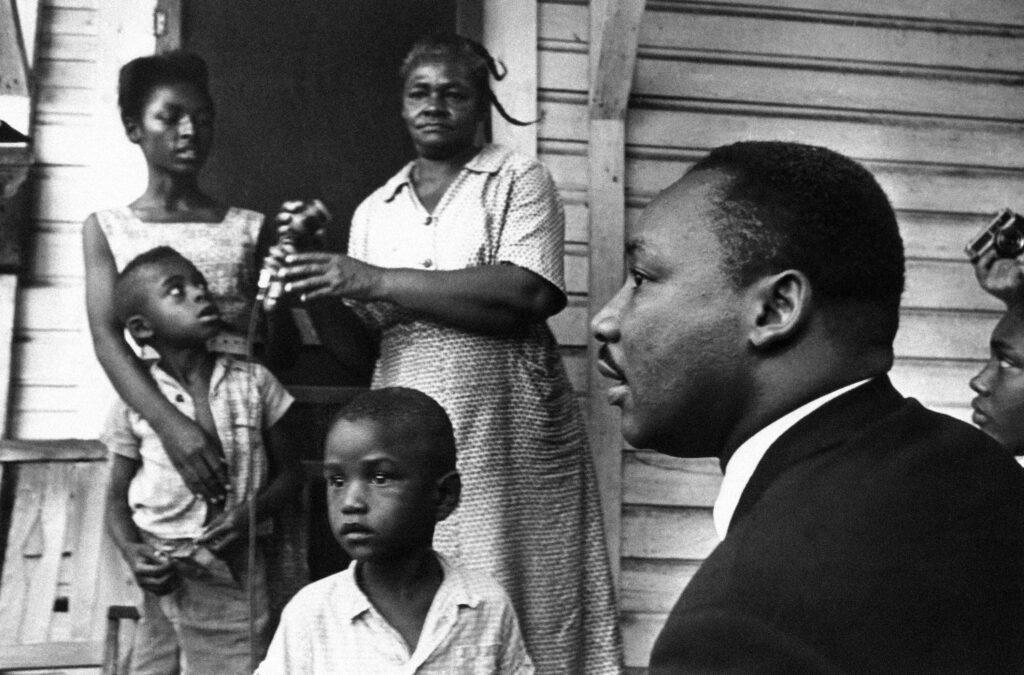
Dr. Martin Luther King Jr., right, chats with Greenwood, Mississippi African Americans on their front porch on July 21, 1964, during his door-to-door campaign, telling all them to register to vote and support his Mississippi Freedom Democratic party. (AP Photo/Jim Bourdier)
“King was not a dreamer. Dr. King was a visionary, who was evolving towards understanding and recognizing the reality of life in America and the world she created post-World War II,” stated Student Minister Abdul Haleem Muhammad. Another sermon from which Dr. King is taken out of context is “The Drum Major Instinct,” delivered February 4, 1968.
“But, in truth, he said some things that, if I didn’t tell you it was Dr. King, you would think it was the Honorable Minister Louis Farrakhan,” stated Student Minister Abdul Haleem Muhammad, who proceeded to quote an excerpt from that message:
“God didn’t call America to do what she’s doing in the world now. God didn’t call America to engage in a senseless, unjust war as the war in Vietnam. And we are criminals in that war. We’ve committed more war crimes almost than any nation in the world, and I’m going to continue to say it. And we won’t stop it because of our pride and our arrogance as a nation,” he stated from Dr. King’s message.
He continued Dr. King’s quote stating: “But God has a way of even putting nations in their place. The God that I worship has a way of saying, ‘Don’t play with me.’ He has a way of saying, as the God of the Old Testament used to say to the Hebrews, ‘Don’t play with me, Israel. Don’t play with me, Babylon. Be still and know that I’m God.
And if you don’t stop your reckless course, I’ll rise up and break the backbone of your power.’ And that can happen to America. Every now and then I go back and read Gibbons’ Decline and Fall of the Roman Empire. And when I come and look at America, I say to myself, the parallels are frightening.”
“King was not a dreamer. Dr. King was a visionary, who was evolving towards understanding and recognizing the reality of life in America and the world she created post-World War II,” stated Student Minister Abdul Haleem Muhammad. Another sermon from which Dr. King is taken out of context is “The Drum Major Instinct,” delivered February 4, 1968.
“But, in truth, he said some things that, if I didn’t tell you it was Dr. King, you would think it was the Honorable Minister Louis Farrakhan,” stated Student Minister Abdul Haleem Muhammad, who proceeded to quote an excerpt from that message:
“God didn’t call America to do what she’s doing in the world now. God didn’t call America to engage in a senseless, unjust war as the war in Vietnam. And we are criminals in that war. We’ve committed more war crimes almost than any nation in the world, and I’m going to continue to say it. And we won’t stop it because of our pride and our arrogance as a nation,” he stated from Dr. King’s message.
He continued Dr. King’s quote stating: “But God has a way of even putting nations in their place. The God that I worship has a way of saying, ‘Don’t play with me.’ He has a way of saying, as the God of the Old Testament used to say to the Hebrews, ‘Don’t play with me, Israel. Don’t play with me, Babylon. Be still and know that I’m God.
And if you don’t stop your reckless course, I’ll rise up and break the backbone of your power.’ And that can happen to America. Every now and then I go back and read Gibbons’ Decline and Fall of the Roman Empire. And when I come and look at America, I say to myself, the parallels are frightening.”
No comments:
Post a Comment